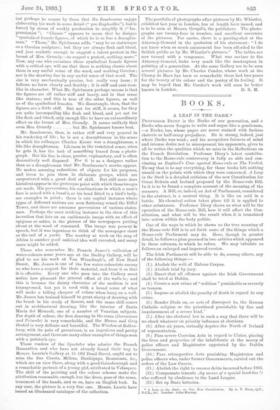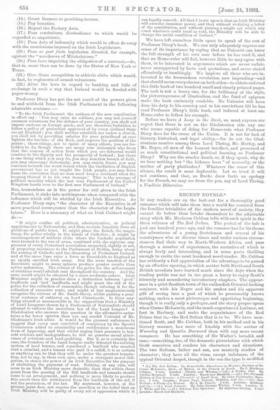BOOKS.
A LEAP IN THE DARK.*
PROFESSOR DICEY is the Burke of our generation, and a Burke who never forgets to write and argue like a gentleman, —a Burke, too, whose pages are never stained with furious rhetoric or half-crazy prejudices. He is strong, indeed, just where Burke was weak ; and his scrupulous fairness of mind and intense desire not to misrepresent his opponents, gives to all he writes the qualities which we miss in the Reflections on the French Revolution. Professor Dicey's latest contribu- tion to the Home-rule controversy is fully as able and con- vincing as England's Case against Home-rule or The Verdict. To say that is to say everything, for those books left nothing unsaid on the points with which they were concerned. A Leap. in the Dark is a detailed criticism of the new Constitution for Great Britain and Ireland proposed by the Home-rule Bill. In it is to be found a complete account of the meaning of the measure. A Bill, or, indeed, an Act of Parliament, considered in the abstract, is a neutral thing. It is like an acid in a, bottle. No chemical action takes place till it is applied to other substances. Professor Dicey shows us what will he the operation of the Home-rule Bill, how it will affect the Con- stitution, and what will be the result when it is translated into action within the body politic.
One of the ways in which be shows us the true meaning of the Home-rule Bill is to set forth some of the things which a Home-rule Parliament may do. Here, though in greater detail, he follows a plan pursued in two articles which appeared in these columns, to which he refers. We may tabulate as follows an enlarged and improved version.
The Irish Parliament will be able to do, among others, any of the following things :— (1.) Abolish the writ of Habeas Corpus.
(2.) Abolish trial by jury.
(30 Enact that all offences against the Irish Government shall be tried at Dublin.
(4.) Create a new crime of " sedition " punishable as severely, as treason.
(5.) Impose or abolish the penalty of death in regard to any crime.
(6.) Render libels on, or acts of disrespect to, the Roman Catholic religion or the priesthood punishable by fine and imprisonment of a severe kind,' (7.) Alter the electoral law in such a way that there will be no check whatever on priestly influence at elections.
(8.) After six years, virtually deprive the North of Ireland of representation.
(9.) Pass severe Coercion Acts in regard to Ulster, placing the lives and properties of the inhabitants at the mercy of police officers and Magistrates appointed by the Dublin Government.
(10.) Pass retrospective Acts punishing Magistrates and police officers who, under former Governments, carried out the orders of the Law Courts.
(11.) Abolish the right to recover debts incurred before 1893.
(12.) Compensate tenants (by means of a special land-tax ?) who suffered by obedience to the Land League.
(13.) Set up State lotteries.
* A Leap in the Dark ; or, Our New Constitution. By A. V. Dicey, Q.C.,. B.C.L., 4co. Londou : John Murray. (14.) Grant licences to gambling-houses.
(15.) Pay bounties.
(16.) Repeal the Factory Acts.
(17.) Pass resolutions, disobedience to which would be regarded as unpatriotic.
(18.) Pass Acts of indemnity which would in effect do away with the restrictions imposed on the Irish Legislature.
(19.) Pass as post facto legislation directed, for example, against the "murderers of Mitchelstown."
(20.) Pass laws impairing the obligation of a contract,—do, that is, more than can be done by the States of New York or Texas.
(21.) Give State recognition to athletic clubs which would, in fact, be regiments of armed volunteers.
(22.) Alter the laws in regard to banking and bills of exchange in such a way that Ireland would be flooded with paper- money.
Professor Dicey has put the net result of the powers given to and withheld from the Irish Parliament in the following admirable sentence :— " To the Irish Parliament the authors of the new constitution in effect say : • You may raise no soldiers, you may not yourself summon volunteers for the defence of your country, you shall not impose customs on foreign goods, and are therefore forbidden to follow a policy of protection approved of by every civilised State except England ; you shall neither establish nor endow a church, you shall not by providing salaries for your priesthood at once lighten the burdens of the flock, and improve the position of the pastor ; these things, not to speak of many others, you are for- bidden to do, though there are many wise statesmen who deem that the courses of action from which you are debarred would conduce to the dignity and the prosperity of Ireland ; but there is one thing which you may do, you may sanction breach of faith, you may encourage dishonesty, you may enjoin fraud, you may continue to teach the worst lesson which the vacillation of English government has as yet taught the Irish people, you may drive home the conviction that no man need keep a covenant when the keeping thereof is to his own damage.' This is the message of political morality which the last true Parliament of the United .Kingdom hands over to the first new Parliament of Ireland."
But, tremendous as is the power for evil given to the Irish Parliament, it sinks into nothingness when compared with the influence which will be wielded by the Irish Executive. As Professor Dicey says, "the character of the Executive is of more practical consequence than the character of the Legis- lature." Here is a summary of what an Irish Cabinet might do :— "It might confine all political, administrative, or judicial appointments to Nationalists, and thus exclude Loyalists from all positions of public trust. It might place the Bench, the magis- tracy, the police wholly in the hands of Catholics ; it might by encouragement of 'athletic clubs where the Catholic population were trained to the use of arms, combined with the rigorous sup- pression of every Protestant association suspected, rightly or not, of preparing resistance to the Parliament at Dublin, bring about the arming of Catholic and the disarming of Protestant Ireland, and at the same time raise a force as formidable to England as an openly enrolled Irish army. But the mere inaction of the Executive might in many spheres produce greater results than active unfairness. The refusal of the police for the enforcement of evictions would abolish rent throughout the country. And the same result might be attained by a more moderate course. Irish Ministers might in practice draw a distinction between 'good' landlords and 'bad' landlords, and might grant the aid of the police for the collection of reasonable, though refusing it for the collection of excessive rents, and might at last magnanimously recognise the virtues of Mr. Smith-Barry, whilst passing a prac- tical sentence of outlawry on Lord Clanricarde. Is there any- thing absurd or unreasonable in the supposition that a Ministry of Land Leaguers chosen by a Parliament of Nationalists should attempt to enforce the unwritten law of the Land League ? A Gladstonian who answers this question in the affirmative enter- tains a far lower opinion than can any candid Unionist of Mr. Gladstone's Irish allies. It would be the grossest unfairness to suggest that every man convicted of conspiracy by the Special Commission added to criminality and recklessness a monstrous form of hypocrisy, and that whilst urging Irish peasants to boy- cott evictors and land-grabbers, he felt no genuine moral abhor- rence of evictions and land-grabbing. But if, as is certainly the case, the founders of the Land League really detested the existing system of land tenure, and considered a landlord who exacted rent a criminal, and a tenant who paid it a caitiff, it is as certain as anything can be that they will be under the greatest tempta- tion, not to say, in their own eyes, under a stringent moral obli- gation, to strain the power of an Irish Executive for the purpose of abolishing the payment of rent. Nothing, at any rate, will seem to an Irish Ministry more desirable than that within three years from the passing of the Bill landlords and tenants should tome to an arrangement, and nothing is more likely to produce this result than the withdrawal from the landlords of the aid, if not the protection, of the law. My argument, however, at the present point does not require the assertion or the belief that an Irish Ministry will be guilty of every act of oppression which it
can legally commit. All that I insist upon is that an Irish Ministry will exercise immense power, and that without violating a letter of the constitution, and without passing a single act which any court whatever could treat as void, the Ministry will be able to change the social condition of Ireland."
We have left ourselves little space to speak of the rest of Professor Dicey's book. We can only adequately express our sense of its importance by saying that no Unionist can know the full strength of his own case before he has read it, and that no Home-ruler will fail, however little he may agree with them, to be interested in arguments which are never unfair, never unsupported by facts and quotations, and never stated offensively or insultingly. We implore all those who are in- terested in the tremendous revolution now impending—and that should mean every elector on both sides—to obtain and read this little book of two hundred small and clearly printed pages.
The task is not a heavy one, for the brilliancy of the style, the picturesqueness of illustration, and the fund of epigram make the book eminently readable. No Unionist will have done his duty to his country and to his convictions till he has read Professor Dicey's little book, and induced at least one Home-ruler to follow his example.
Before we leave A Leap in the Dark, we must express our regret that there is not on the Gladstonian side any one who seems capable of doing for Home-rule what Professor Dicey does for the cause of the Union. It is not for lack of literary, historical, and legal ability,—for do not the Glad- stonians number among them Lord Thring, Mr. Morley, and Mr. Bryce, all men of the keenest intellect, and possessed of as much constitutional and political learning as Professor Dicey? Why are the oracles dumb, or, if they speak, why do we hear nothing but "the hideous hum" of necessity, or the mutter of party platitudes ? Whatever the cause of this silence, the result is most deplorable. Let us trust it will not continue, and that, as Burke drew forth an apology for the French, we may see from the pen, say of Lord Thrbag, a Vincliciw Hibernicw.



















































 Previous page
Previous page